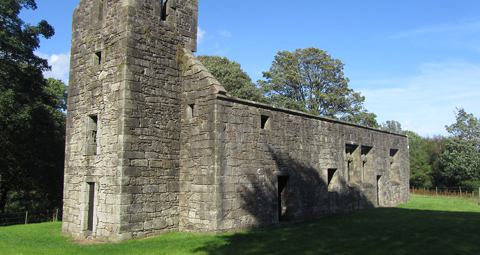BY Ryan McDougall | October 18 | ![]() 0 COMMENTS
0 COMMENTS ![]() print
print

We must know our Catholic history, but focus on the injustices of the present
Songs about historic defeats pull the heart strings but are no guide for our times, finds Ross Ahlfeld
Each year, on September 9, I travel to the village of Lochwinnoch in Renfrewshire for a hike out to the old ruined Collegiate Church, followed by a walk through Park Hill Wood, and ending with a lovely pint in the cosy Brown Bull Inn.
The late Gothic Collegiate Church at Lochwinnoch (above) was built by the Scottish Knight Sir John Sempill. At one time, the church was served by a provost, six chaplains, two altar boys and a sacristan.
Five centuries ago, on September 9 1513, Lord Sempill was killed during the Battle of Flodden alongside his King. The church was then used to house Lord Sempill’s highly ornate monument.
Fallen Scots
Our nation has never really recovered from the battle, at which King James IV of Scotland, a great number of his nobles, and 10,000 Scots were killed.
The battle is recalled in the song The Flowers of the Forest, a lament for young men killed in war.
The folly of war is also condemned in the similar Pete Seeger classic Where Have All The Flowers Gone?
The emotion contained within this sad song perhaps strikes a chord with us because Where Have All The Flowers Gone? is in its essence a deeply Catholic song in what is known as the ‘Ubi sunt’ tradition.
‘Ubi sunt’ comes from our Vulgate Bible and translates from the Latin as ‘where are they?’ This term is regarded by Biblical scholars as a mediation on life’s transience which occurs in very many beautiful Catholic homilies including one written by St Augustine who asks: “Tell me, where are the kings, where are the princes, where the emperors, who had been before us?”
John Knox
This passage from scripture also forms part of the Mass on Holy Saturday in the traditional Roman Missal and Breviary.
Lord Sempill’s clan would later become strong opponents of John Knox, and their castle here at Lochwinnoch was regarded as a stronghold of resistance against the Reformation. The 3rd Lord Robert Sempill also supported Mary Queen of Scots who (quite auspiciously) was also crowned Queen of Scots on September 9, 1543, and Sir Robert’s loyalty to the Catholic Queen was acknowledged in a letter from Pope Pius IV.
Remarkably, from the same family there came also Colonel William Sempill of Lochwinnoch who, while in the service of the Spanish Crown, founded the Royal Scots College seminary in Madrid in 1627. The college later moved to Valladolid and is now currently in Salamanca where it continues to be used for priestly formation today.
Even so, when I come up here to Lochwinnoch each year, I don’t arrive as a nostalgic Catholic yearning for a return to a golden age. Neither do I come here as a history buff, nor as a Scottish patriot or even as a late Middle Ages warfare enthusiast. Rather, I come as an individual with a great love and appreciation for not only The Flowers of the Forest but for all old folk songs, epic poems, Scottish travellers’ tales and medieval ballads, all full of romance and tragedy.
Battle of Kosovo
Epic poems like the Kosovo Cycle which tells the story of the Serbian Prince Lazar’s death at the Battle of Kosovo in 1389, just as King James died at Flodden. This battle, also known as the ‘Battle of the Field of Blackbirds,’ remains strongly linked to Serbian popular imagination and is commemorated every year on ‘Vidovdan’ (St Vitus’ day), very much like the annihilations documented in other poems and songs such as the Gododdin of Aneirin and The Fall of Troy.
All of this art and literature concerning sacrifice and sorrow perhaps appeals to what is known as the ‘Catholic Imagination,’ but alas, King James, Lord Sempill and Mary Queen of Scots are all now long since faded and gone like ‘the flowers of the forest.’
In truth, places like Lochwinnoch are no longer our Catholic heartlands where our steadfast nobles once made their heroic last stand in defence of the Faith. Neither are the great Catholic monarchs of Scotland making a return any time soon. As Augustine sorrowfully asks: “Where are the kings who had been before us?”
We must, however, let this history go and move on. We must let bygones be bygones and focus on the here and now and the fact that there are still young soldiers around the world lying ‘cauld in the clay.’
Persecution
Similarly, all our activism, prayers, solidarity and feelings of unity would be better offered in the service of persecuted Christians in Nigeria, rather than with those who died 500 years ago.
According to Aid to the Church in Need, the ongoing brutal persecution of Christians in Nigeria at the hands of Boko Haram has been intensified by further attacks from Militant Islamist Fulani herdsmen in Nigeria’s Middle Belt region. Last February and March, they attacked and killed more than 150 Christians.
Equally, in India, over 450 incidents of Christian persecution were reported in 2018, including physical violence and attacks on churches, priests and Religious.
Meanwhile, in the Philippines in January, Islamist extremists bombed Our Lady of Mount Carmel Cathedral in Jolo during morning Mass, killing 20 parishioners.
Understanding
We should hold our suffering co-religionists in the same esteem as our ancestors in Faith. It’s vital for us to continue to protest, pray and organise for our sisters and brothers in Christ all over the world today. We also need to work for interreligious understanding and dialogue alongside the struggle for justice and peace, rather than giving undue honour and reverence to things like ancient warfare or historic ethnic and religious conflicts.
In truth, there is no sacred soil soaked in the blood of our ancestors; there is only the futility and scandal of war being made against innocent civilians and our young people being sent far away to their deaths.
Despair and death never have the last word, and we must never surrender our hope as Christians. As Pete Seeger sang: “Oh when will they ever learn?”










